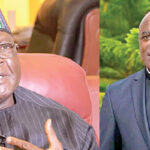On Monday, February 26, President Bola Tinubu ordered the full implementation of the Oronsaye report, 12 years after the submission of Steve Oronsaye panel’s report on restructuring and rationalising Federal government parastatals and agencies, and subsequent issuance of a white paper two years later.
In this explainer, TRIBUNE ONLINE discusses all you need to know about the Oronsaye report.
What Oronsaye report entails
The Oronsaye Report is a document that contains recommendations for restructuring and rationalising the Federal Government of Nigeria’s agencies, parastatals, and commissions.
Key proposals
Some of the key proposals are:
- The reduction of statutory agencies from 263 to 161. This would involve the abolition of 38 agencies, the merger of 52, and the reversion of 14 departments in ministries.
- The abolition of some controversial agencies, such as the Federal Character Commission, the Fiscal Responsibility Commission, and the National Poverty Eradication Programme.
- The rejection of some recommendations related to the National Youth Service Scheme, such as the extension of the service year to 18 months and the introduction of a compulsory military training component.
- The changes in the status of some agencies, such as the Federal Civil Service Commission, the Code of Conduct Tribunal, and the National Human Rights Commission, to make them more independent and accountable.
Merits
Some of the benefits are:
- The reduction of the cost of governance by about N862 billion per annum, which could be used for other developmental projects and programmes.
- The elimination of overlaps, duplications, and redundancies in the functions and mandates of the government entities, would improve service delivery and performance.
- The optimization of the human and material resources of the government would enhance productivity and efficiency.
- The alignment of the government structure with the national development goals and priorities would foster coordination and synergy among the relevant stakeholders.
Challenges
Some of the challenges are:
- The resistance from the career civil servants, the National Assembly, and the politicians, may perceive the report as a threat to their interests, influence, and patronage.
- The legal and constitutional hurdles may require amendments to the enabling Acts and laws of some of the affected agencies and entities.
- The lack of political will and commitment may result in the selective or partial implementation of the report, depending on the convenience and preference of the executive and legislative arms of government.
- Additional details extracted from Okay.ng
WATCH TOP VIDEOS FROM NIGERIAN TRIBUNE TV
- Let’s Talk About SELF-AWARENESS
- Is Your Confidence Mistaken for Pride? Let’s talk about it
- Is Etiquette About Perfection…Or Just Not Being Rude?
- Top Psychologist Reveal 3 Signs You’re Struggling With Imposter Syndrome
- Do You Pick Up Work-Related Calls at Midnight or Never? Let’s Talk About Boundaries







